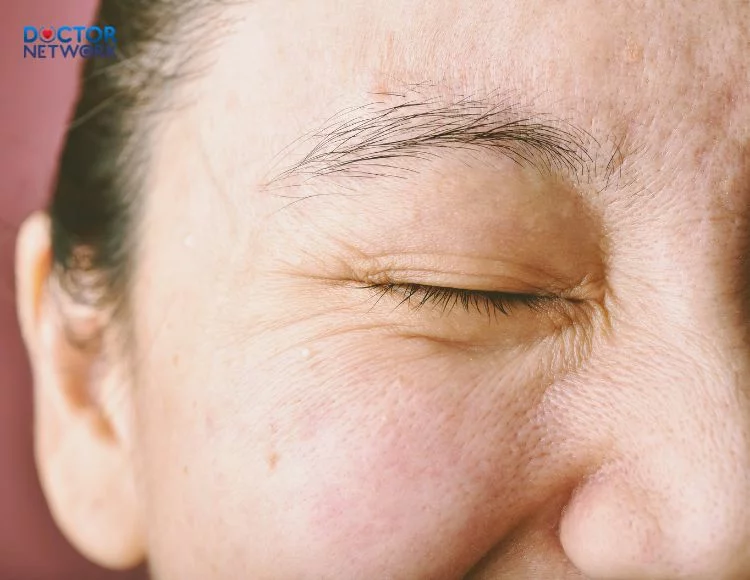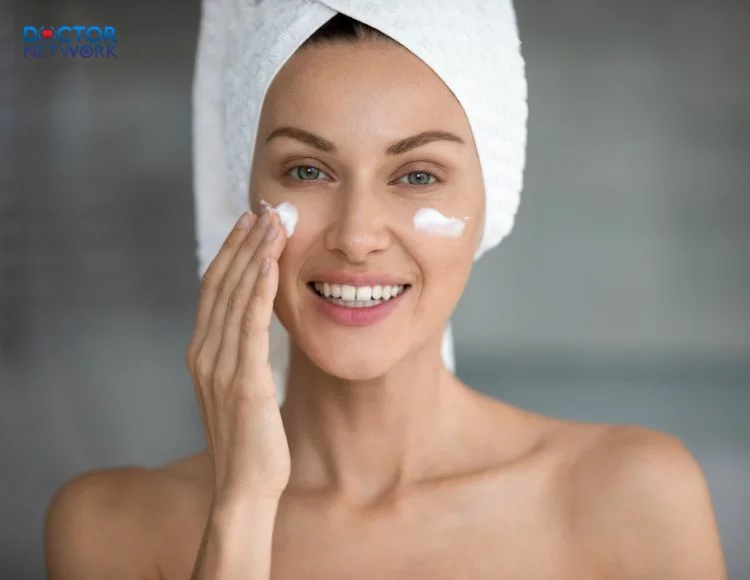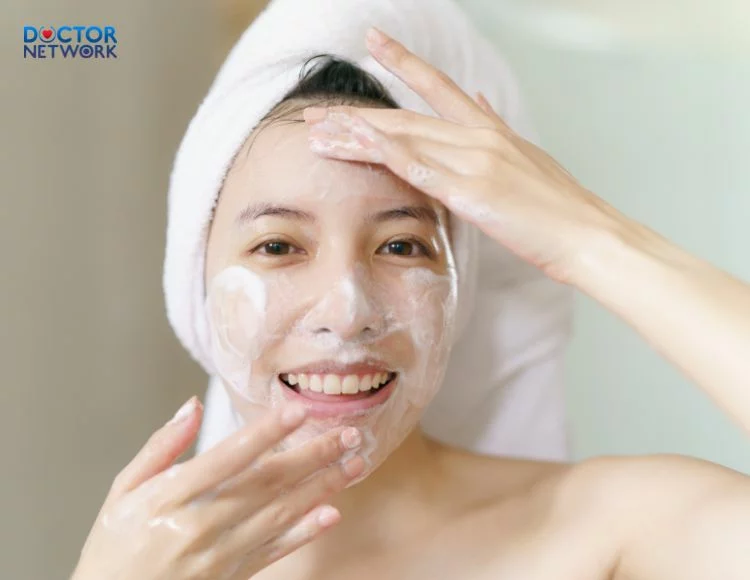Allergic facial skin reactions, accompanied by itching symptoms, are common dermatological issues that many people encounter in their daily lives. So, “what to do with allergic and itchy face“. In this article, we will delve into understanding the causes, symptoms, treatment methods, and care measures for sensitive skin, providing a comprehensive guide for those facing allergic and itchy facial skin issues.
Causes of Itchy Skin
The causes of itchy facial skin can be diverse and complex, but mostly related to allergic skin reactions. Facial allergic reactions, specifically contact dermatitis, occur when the skin comes into direct contact with an irritant or allergen. Common causes include:
- Cosmetics and skincare products: Many cosmetics contain chemicals that can irritate or cause allergies for sensitive skin, including preservatives, fragrances, and alcohol.
- Chemicals in cleaning products: Cleaning agents, soaps, and other household chemicals can irritate the skin upon contact.
- Foods: Some foods can cause internal allergic reactions, leading to skin symptoms like itching and rashes.
- Weather: Dry and cold weather can deplete the skin’s natural moisture, causing it to become dry and itchy.
- Genetic and environmental factors: Some people are more susceptible to allergies due to genetic factors or environmental factors.
To identify early signs of allergic reactions, watch out for symptoms such as:
- Redness and swelling: Areas of skin in contact with allergens or irritants often become red and may swell.
- Itching: Itching is a common and often immediate symptom upon exposure.
- Redness or rash: These signs often appear in the affected skin areas.

Redness or rash often appear in the affected skin areas
- Dryness and flaking: Especially in dry conditions, the skin can become dry and flaky.
Symptoms of Facial Allergic Reactions
The symptoms of facial allergic reactions can manifest in various forms, depending on the cause and the individual’s body response. Common symptoms include:
- Redness and swelling: The most common symptom, where the affected skin areas become red and may swell.
- Itching: A symptom that many find unbearable, causing continuous discomfort.
- Redness or rash: Red spots or rashes may appear and spread across the affected skin area.
- Flaking, cracking, or dry skin: The skin can become dry and flaky, sometimes cracked, especially when the allergic reaction leads to skin dehydration.
- Stinging or burning sensation: Some people may feel a stinging or burning sensation on the skin.
To distinguish between facial allergic reactions and other skin issues, consider the following:
- Onset time: Allergic reactions often occur quickly after exposure to an irritant or allergen, while other skin issues may develop more slowly.
- Location of symptoms: Allergic reactions on the face usually appear clearly in areas in contact with the irritant, while conditions like eczema or psoriasis may appear in specific skin areas not necessarily related to recent contact.
- Intensity of itching: Allergic reactions often cause more itching than some other skin issues, and the itching sensation usually increases upon continued exposure to the irritant.
- Relation to triggering factors: Allergic reaction symptoms often decrease when avoiding the triggering substance, while chronic skin conditions may not necessarily respond in the same way.
Understanding these symptoms and distinguishing them from other skin issues is crucial for accurate diagnosis and choosing appropriate treatment methods. If you suspect you have a facial allergic reaction, seek medical advice promptly.
What to do with allergic and itchy face?
What to do with allergic and itchy face? Treating facial allergic reactions requires a comprehensive approach, combining avoiding contact with irritants, using medications to alleviate symptoms, and lifestyle changes. Here are some common treatment methods along with their pros and cons:
1. Avoiding Contact with Irritants
- Pros: Prevention is the most effective method to avoid facial allergic reactions.
- Cons: It can sometimes be challenging to identify the exact irritant, requiring time and patience.
2. Using Corticosteroid Creams – what to do with allergic and itchy face
- Pros: Quickly reduces symptoms like inflammation, swelling, and itching.
- Cons: Long-term use can thin the skin and increase the risk of skin infections. Consult a doctor before using.

Long-term use can thin the skin and increase the risk of skin infections
3. Moisturizers and Skin Barrier Protection
- Pros: Supports skin barrier recovery, reducing dryness and itching.
- Cons: Careful product selection is required to avoid irritant ingredients.
4. Antihistamine Medications
- Pros: Reduces itching and some other allergic reactions.
- Cons: Some medications can cause drowsiness, affecting daily activities.
5. Phototherapy – what to do with allergic and itchy face
- Pros: Effective for some difficult-to-treat allergic skin conditions.
- Cons: Requires multiple treatment sessions, with potential risks of skin cancer from UV light exposure.
6. Dietary Adjustments
- Pros: Improves skin health from within, preventing food-related allergies.
- Cons: Time is needed to see improvements, and it can be challenging to identify the allergenic food.
7. Consultation with a Dermatologist – what to do with allergic and itchy face
- Pros: Provides accurate advice and personalized treatment plans.
- Cons: Scheduling and costs for consultations may be required.
Each treatment method has its own pros and cons. Therefore, choosing the appropriate method should be based on each individual’s specific condition, the severity of the facial allergic reaction, and the body’s response to each treatment.
Caring for Sensitive Skin
Properly caring for sensitive skin is essential to minimize the risk of developing allergic reactions and itching on the face. An appropriate skincare regimen not only soothes sensitive skin but also strengthens the skin barrier, reducing negative environmental impacts. Here’s a guide to skincare and a list of safe skincare products for sensitive skin:
- Skincare Guide for Sensitive Skin:
- Gentle cleansing: Use a gentle facial cleanser designed for sensitive skin, free of soap and with a balanced pH. Avoid using water that is too hot or too cold when washing your face.
- Moisturize: Choose moisturizers without fragrances, alcohol, and potential irritants. Moisturizing helps restore the skin’s protective barrier, reducing dryness and itching.
- Protect from environmental factors: Use sunscreen designed for sensitive skin daily, even on cloudy days. Avoid direct exposure to cold winds and pollution.
- Patch test new products: When using new products, apply a small amount to a less sensitive area like the forearm and wait at least 24-48 hours to see if there’s any allergic reaction.
- List of Safe Skincare Products for Sensitive Skin:
- Gentle facial cleansers: Products free of soap, fragrance-free, and dermatologically tested for sensitive skin.

Products free of soap, fragrance-free, and dermatologically tested for sensitive skin
- Moisturizers: Choose moisturizers free of fragrances, alcohol, parabens, and phthalates. Prioritize products containing ceramides, glycerin, and hyaluronic acid to enhance moisturization.
- Sunscreen for sensitive skin: Physical sunscreens (containing zinc oxide or titanium dioxide) are usually less irritating than chemical sunscreens. Choose products labeled “broad-spectrum” and with SPF 30 or higher.
Remember, caring for sensitive skin requires patience and consistency. Regularly following a suitable skincare regimen and avoiding known irritants and allergens can significantly improve the condition of sensitive skin, reducing the risk of allergic reactions and facial itching.
Some Related Studies about “what to do with allergic and itchy face”
Here are some related studies about “what to do with allergic and itchy face“:
Avoiding Contact with Allergens:
Study from Seoul National University College of Medicine:
The study indicates that exposure to allergens can exacerbate the severity of allergic reactions.
Using Moisturizers:
Article in the “Dermatology and Therapy” journal in 2019:
The article states that moisturizers help protect the skin from environmental damage and reduce
Conclusion
What to do with allergic and itchy face? Facial allergic reactions and itching can be challenging to manage due to various causes and symptoms. However, understanding the causes, identifying early signs, and choosing appropriate treatment methods can significantly improve skin health and quality of life. By following a comprehensive approach, combining prevention, treatment, and care measures, individuals with sensitive skin can effectively manage and reduce allergic reactions and itching on the face, promoting healthier and more comfortable skin.
References:
https://www.medicalnewstoday.com/articles/321376
https://www.self.com/story/skin-after-allergic-reaction-on-face
Kiểm Duyệt Nội Dung
More than 10 years of marketing communications experience in the medical and health field.
Successfully deployed marketing communication activities, content development and social networking channels for hospital partners, clinics, doctors and medical professionals across the country.
More than 6 years of experience in organizing and producing leading prestigious medical programs in Vietnam, in collaboration with Ho Chi Minh City Television (HTV). Typical programs include Nhật Ký Blouse Trắng, Bác Sĩ Nói Gì, Alo Bác Sĩ Nghe, Nhật Ký Hạnh Phúc, Vui Khỏe Cùng Con, Bác Sỹ Mẹ, v.v.
Comprehensive cooperation with hundreds of hospitals and clinics, thousands of doctors and medical experts to join hands in building a medical content and service platform on the Doctor Network application.

























